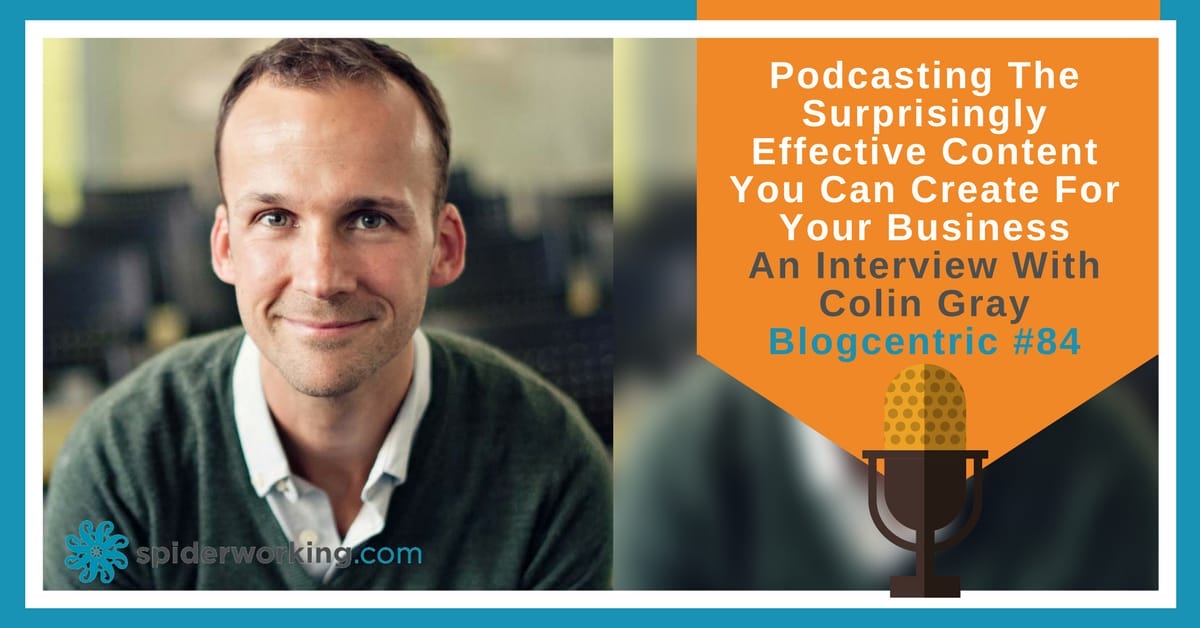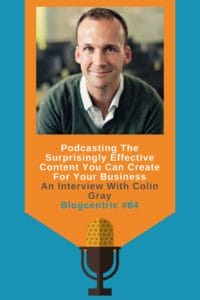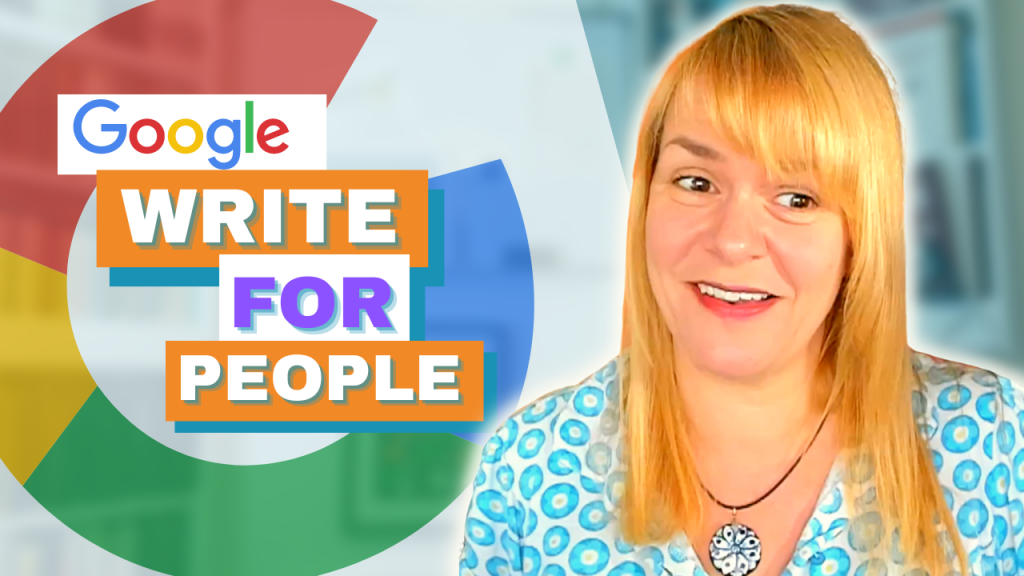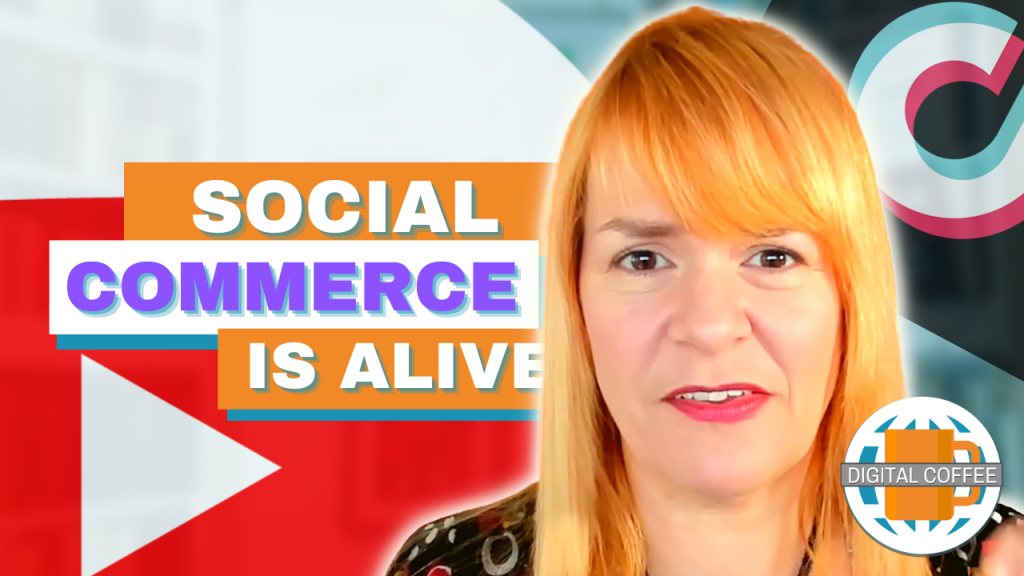
An Interview With Colin Gray
There’s one type of content that you should be creating that will deliver better results, sales and conversions than your blog alone. Podcasts. Or that’s what this week’s guest claims.
Colin Gray started podcasting when he was teaching at Edinburgh Napier University. The series he recorded as a course for lecturers back then formed the first series of his first public podcast many years later.
Now Colin, The Podcast Blog produces four podcasts and has an academy, teaching others how to start, build and grow their podcasts.
I asked Colin to join me on the Blogcentric podcast and share some of his wisdom.
He tells us:
- How to get started with almost no equipment
- How to save time creating podcasts
- What’s so great about podcasting
- How to get listeners
Listen To The Interview
Podcast: Play in new window | Download
Subscribe: Apple Podcasts | RSS
Highlights
Tell me a bit about the Podcast Host
The Podcast Host is a site I started in 2011 to share what I was learning about podcasting at the time. I’d got into podcasting because I was teaching it at University. I’m really proud of the resource it’s become. It offers support for everything about equipment right up to monetising, promoting and making your podcast successful.
You have four podcasts. You must spend most of your time writing?
I suppose it’s a hazard of the job, being a podcast teacher. We run our podcasts as seasons which makes life a lot easier.
Right now I’m in the middle of a ‘Podcraft’ season, we just finished up recording the first season of ‘The Numbers Game‘ which is on a break now.
‘UK Business Start Up‘ is a once a year season because it’s really heavily produced. ‘Mountain Bikes Apart‘ is just something I like talking about.
We do it in an as an efficient way as possible.
Now you’re going to have to share those efficient ways with me
Seasons is the first tip. We save a lot of time by planning out a season at a time.
We’re on season eight of Podcraft and it’s a listener question series. We started by collecting together ten-twelve questions, we put them in a planning document and spend about an hour coming up with outline bullet point answers to those questions. Then we batch record three or four episodes at a time.
I and my co-host Matthew sit down for two or three hours in the first week of the month. We go through the plan, we record for an hour or and that gives us four episodes. We edit them in a batch too which saves time. That process gives us content for an entire month.
We can do four episodes of Podcraft in less than a day, maybe four or five hours in total.
Do you think having a co-host helps the discipline of batching?
Having a co-host does help in a number of ways.
It helps you stay regular. For the mountain biking show I’ve got a co-host who’s based down south (Colin is based in Scotland), he’s racing a lot and out of the country a lot so we have to arrange our recording sessions really far in advance. We have a date in the diary every two weeks to record two episodes.
There have definitely been times when I’ve come into the office and seen that appointment in the diary and I’ve thought, there’s so much to do, if only I could move it, but I can’t. I go ahead with it. Having that person that’s always relying on you and having the schedule ahead of time always helps you stay committed.
I find that for solo shows I tend to plan more, I map out the episode and go into more detail. When I’m with a co-host it’s just like having a chat. It’s a lot more dynamic.
What should we look for in a co-host?
It’s a commitment. You have to find someone who is in it for the long term, who will be reliable and will show up every week and that you’re going to get on with.
The best podcasts are the ones where the hosts have chemistry.
What was your first podcast?
My first podcast was a precursor to Podcraft.
I ran a course on podcasting for two weeks for lecturers at Napier University. The lecturers would sign up and for a two week (ten day course). Each day they’d get an episode that would tell them something about podcasting, something about how it could be used in teaching and over the duration of the course it would show them how to get their first episode started.
It was ten episodes on its own with that purpose in mind. I ran that course three or four times and I refined it each time. That was what got me into teaching podcasting and that formed the first series of Podcraft.
It was that that got me into podcast seasons. When you think about it a season is just a course. You choose a subject you want to teach, you break it down into episodes and then you deliver it as a sequence of lessons that tie into each other.
If someone wants to start a podcast, what are the basics that they need?
The best thing about podcasting is that it’s so easy to get started, you need virtually nothing.
People always worry about microphones. The great thing is you can get good quality audio from your smartphone.
Pick up your phone and look at the apps. Almost certainly you’ll have a voice recorder app. Open that app up and put the phone up to your ear as if you are making a phone call. Speak into that voice recorder and that will be really good quality audio.
To record a solo episode that’s all you need to do. Pull out your phone, hold it up to your ear and just talk through your script for ten minutes. It’s a great way to start.
What’s the benefit of podcasting?
One of the biggest struggles business owners have is standing out, being found, being discovered. Podcasting is great for that because it showcases your personality. It’s engagement, it’s connection, it helps you connect one-to-one with your listeners and that builds trust.
You’ll get found more because you’ll appear on search engines like iTunes, Stitcher, Tune in Radio. Once they find you they’ll subscribe to your show, they’ll listen to episodes, they’ll get to know your personality.
Listeners will either connect with you or they won’t. If they don’t like you that’s great, your qualifying them, they’re not the kind of people you want to work with anyway. If they do like you because of the personality, the transparency, the honesty, that’s what builds that trust.
The thing that really accelerates that trust is attention. You could argue that YouTube does the same thing. YouTube shows your personality too.
The problem with YouTube is attention. You’re lucky if you get three or four minutes of attention before people switch to something else. With podcasting it’s a side medium, it’s something you do in your wasted time. People listen for hours at a time.
They’re mowing the lawn, driving the car, on the bus. They want entertainment because they are doing a rote task. You get their attention for longer. Get that attention and you get the trust that it can build. Suddenly you have this medium where your audience becoming absolute raving fans. These are the people who will buy what you do and they’ll rave about it to the rest of the world.
Is there any trick to getting your podcast out there and getting more downloads?
Don’t be disappointed with download numbers if they’re not in the tens of thousands. The power of podcasting is that because it is such an engaging medium you get really good conversions.
For example, looking at our numbers. Our website gets around two and a half thousand visitors a day. Podcraft gets around one thousand listeners per episode, so that’s way less than the website.
However when people visit the website they come in, read an article and then jump out again. They’re just there to get something. A few of those people will be fans of the site and keep coming back.
With a podcast, because of the nature of it, because people are coming back, subscribing, getting episodes week in, week out, they’re getting to know you. They’re not getting that through the website.
We get far more actions and conversions from the one thousand podcast listeners than all the people who visit our website.
Even if you have two or three hundred downloads you could get half of that audience to buy your product because they know and trust you so much.
There’s no secret sauce to growing your listeners. I’ll tell you the same things as everyone else.
- Be regular, put your show out every single week.
- Do what you say you are going to do. If you say you are going to do a series of twelve and you’re going to do it weekly then deliver on that.
- Make good content, make the effort. If you do an interview and you think it sucks, don’t put it out. Have pride in what you are putting out there and know that every single thing you are doing is the best it can be.
- Do interview swaps. Get on other people’s shows and get them on your shows so you’re swapping audiences.
- Competitions have worked really well for us in the past. Ask people to leave you an honest review (Don’t say five-star because you can’t incentivise five-star reviews) and pick a winner from the reviews left in the last week and give them a prize. It’s a good way of building an audience because you get the reviews, which pushes you up the rankings. If you share the competition around it gets you a bit of extra hype as well.
What’s the best way to do show notes? A blog post, a transcription or just links and highlights?
I listen to a lot of podcasts but I rarely look at the show notes but it’s still a good thing to do for your listeners. I know I sometimes go to show notes to look up resources mentioned in an episode.
For me, show notes are about the search. Tt’s putting the content out there in a way that people can find it.
For Podcraft the latest episode we did was answering a question about finding your voice. That is a question people are also typing into Google.
If we had really bare show notes they will never show up in search results because it doesn’t have any weighty content. If I do a transcription (or a blog post) I’m going to be mentioning the keyword ‘how to find your voice’ in the text. Suddenly Google realises what that content is about and delivers it to people in search results.
Getting found and getting people onto your podcast is one of the primary purposes of show notes for me.
The secondary purpose of show notes for your existing customer is that they can revisit stuff several months down the line.
For example, we’ve been revamping a lot of our old content recently and Pat Flynn did an episode about that on Smart Passive Income. It was a long time ago but I’ve referenced his show notes a number of times. I don’t want to go back and listen again but I want to skim through the pertinent points.
I think writing a proper blog post that covers the same topic, gives all the same points, teaches the same thing, that is designed to be read is a more effective way of doing show notes.
What player do you recommend with your site?
- On The Podcast Host we just use Blubrry PowerPress.
- The Soundcloud player is pretty sexy even if their podcast hosting isn’t ideal in many ways.
- Simple Podcast Press is a really nice player with lots of options. It looks good and you can add things like an email capture, social follows and more.
Finally, what microphone are you using right now? You sound great.
- I’m currently using the Shure SM28
- Plugged into my Yamaha MG10 mixer
- Going into our Zoom H5 recorder
- Recording via Skype on a Mac mini
Find Colin online
- The Podcast Host
- The Podcast Host Academy
- Twitter @thepodcasthost
- Colin’s post about content stacking on Social Media Examiner is well worth a read
Colin is a podcaster, a writer and a speaker, and teaches new media skills at ThePodcastHost.com. He and his team run a network of shows, from Podcraft to Mountain Bikes Apart, and teach how to Podcast inside their Academy‘s courses and live support. Outside work, you can usually find him on the nearest mountain biking trail, or vainly attempting to wrangle his kids on an ill-fated camping trip.
Challenge
This week’s challenge is to follow Colin’s advice:
Pull out your smartphone, find the voice recorder, hold it up to your ear and record a short solo podcast.
Share your results with me below
Do Facebook ads make you tear your hair out? Let us manage your Facebook ads for you. We'll save you time and improve results. Get A Quote Now.









